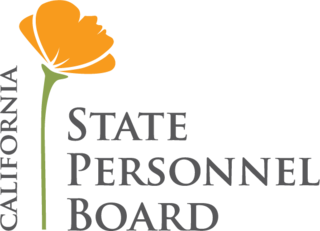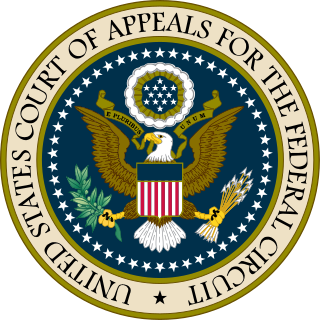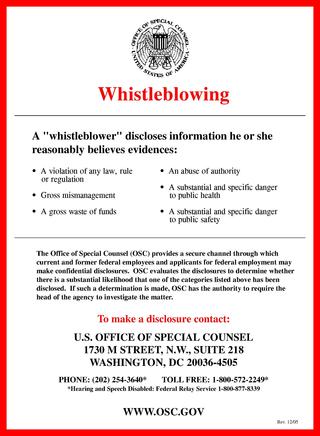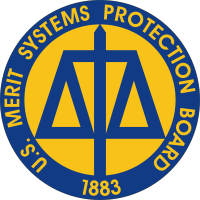
The United States Office of Personnel Management (OPM) is an independent agency of the United States government that manages the United States federal civil service. The agency provides federal human resources policy, oversight, and support, and tends to healthcare (FEHB), life insurance (FEGLI), and retirement benefits for federal government employees, retirees, and their dependents.
The excepted service is the part of the United States federal civil service that is not part of either the competitive service or the Senior Executive Service. It provides streamlined hiring processes to be used under certain circumstances.
An administrative law judge (ALJ) in the United States is a judge and trier of fact who both presides over trials and adjudicates claims or disputes involving administrative law. ALJs can administer oaths, take testimony, rule on questions of evidence, and make factual and legal determinations.

The Senior Executive Service (SES) is a position classification in the United States federal civil service equivalent to general officer or flag officer rank in the U.S. Armed Forces. It was created in 1979 when the Civil Service Reform Act of 1978 went into effect under President Jimmy Carter.

The United States Office of Special Counsel (OSC) is a permanent independent federal investigative and prosecutorial agency whose basic legislative authority comes from four federal statutes: the Civil Service Reform Act, the Whistleblower Protection Act, the Hatch Act, and the Uniformed Services Employment and Reemployment Rights Act (USERRA). OSC's primary mission is the safeguarding of the merit system in federal employment by protecting employees and applicants from prohibited personnel practices (PPPs), especially reprisal for "whistleblowing." The agency also operates a secure channel for federal whistleblower disclosures of violations of law, rule, or regulation; gross mismanagement; gross waste of funds; abuse of authority; and substantial and specific danger to public health and safety. In addition, OSC issues advice on the Hatch Act and enforces its restrictions on partisan political activity by government employees. Finally, OSC protects the civilian employment and reemployment rights of military service members under USERRA. OSC has around 140 staff, and the Special Counsel is an ex officio member of Council of Inspectors General on Integrity and Efficiency (CIGIE), an association of inspectors general charged with the regulation of good governance within the federal government.

The Civil Service Reform Act of 1978, (CSRA), reformed the civil service of the United States federal government, partly in response to the Watergate scandal. The Act abolished the U.S. Civil Service Commission and distributed its functions primarily among three new agencies: the Office of Personnel Management (OPM), the Merit Systems Protection Board (MSPB), and the Federal Labor Relations Authority (FLRA).
The United States federal civil service is the civilian workforce of the United States federal government's departments and agencies. The federal civil service was established in 1871. U.S. state and local government entities often have comparable civil service systems that are modeled on the national system to varying degrees.

The Whistleblower Protection Act of 1989, 5 U.S.C. 2302(b)(8)-(9), Pub.L. 101-12 as amended, is a United States federal law that protects federal whistleblowers who work for the government and report the possible existence of an activity constituting a violation of law, rules, or regulations, or mismanagement, gross waste of funds, abuse of authority or a substantial and specific danger to public health and safety. A federal agency violates the Whistleblower Protection Act if agency authorities take retaliatory personnel action against any employee or applicant because of disclosure of information by that employee or applicant.

Executive Order 13087 was signed by U.S. President Bill Clinton on May 28, 1998, amending Executive Order 11478 to prohibit discrimination based on sexual orientation in the competitive service of the federal civilian workforce. The order also applies to employees of the government of the District of Columbia, and the United States Postal Service. However, it does not apply to positions and agencies in the excepted service, such as the Central Intelligence Agency, National Security Agency, and the Federal Bureau of Investigation.

Robert J. MacLean is a former United States Federal Air Marshal and whistleblower.

The Executive Office for Immigration Review (EOIR) is a sub-agency of the United States Department of Justice whose chief function is to conduct removal proceedings in immigration courts and adjudicate appeals arising from the proceedings. These administrative proceedings determine the removability and admissibility of individuals in the United States. As of January 19, 2023, there were sixty-eight immigration courts and three adjudication centers throughout the United States.

The California State Personnel Board (SPB), one of California's constitutional offices, is one of the California agencies responsible for administration of the merit-based civil service employment system for California state agencies, the other being the California Department of Human Resources.
Human resource management in public administration concerns human resource management as it applies specifically to the field of public administration. It is considered to be an in-house structure that ensures unbiased treatment, ethical standards, and promotes a value-based system.

Huffman v. Office of Personnel Management, 263 F.3d 1341 is a decision by the United States Court of Appeals for the Federal Circuit addressing a two decade-old conflict between the United States Congress and the U.S. Court of Appeals for the Federal Circuit over the depth of whistleblower protection available to federal civilian employees covered by the Whistleblower Protection Act of 1989. The discourse revolves around the meaning of the word 'any'.

A whistleblower is a person who exposes any kind of information or activity that is deemed illegal, unethical, or not correct within an organization that is either private or public. The Whistleblower Protection Act was made into federal law in the United States in 1989.
Curtis Douglas vs. Veterans Administration (5 Merit Systems Protection Board, 313 was a case decided by the Merit Systems Protection Board which established criteria that supervisors must consider in determining an appropriate penalty to impose for an act of federal employee misconduct.
Elgin v. Department of the Treasury, 567 U.S. 1 (2012), was a United States Supreme Court case where the Court ruled that the Civil Service Reform Act of 1978 (CSRA) gives exclusive jurisdiction for claims under the Act to the U.S. Court of Appeals for the Federal Circuit. Additionally, the Court held that the Act bars federal district courts from ruling on matters related to the act including adverse employment actions of the federal departments, and allows the Merit Systems Protection Board to hear constitutional arguments for wrongful employee severance and adverse employment actions. It was a 6–3 decision, with the majority opinion delivered by Justice Clarence Thomas. The case greatly limited the recourse of federal employees to the courts for adverse employment practices, allowing such recourse only to a few, specific courts as aforementioned.
Kloeckner v. Solis, 568 U.S. 41 (2012), is a decision by the Supreme Court of the United States involving federal employee grievance procedures under the Civil Service Reform Act of 1978. The issue was whether a so-called "mixed case" involving both wrongful termination and discrimination claims should be appealed from the Merit Systems Protection Board to a federal district court or to the United States Court of Appeals for the Federal Circuit.

The All Circuit Review Extension Act is an Act that extended for three years the authority for federal employees who appeal a judgment of the Merit Systems Protection Board (MSPB) to file their appeal at any federal court, instead of only the U.S. Court of Appeals. This was a pilot program established in the Whistleblower Protection Enhancement Act of 2012 to last only two years.
Sherry Chen is an American hydrologist who worked in the National Weather Service (NWS) office in Wilmington, Ohio. She was accused of spying and arrested in October 2014. In March 2015, federal prosecutors dropped all charges against her without explanation before the trial began. Even with the case dropped, Chen was fired from her job in March 2016 for many of the same reasons that she was originally prosecuted for. In October 2016, Chen filed a case of wrongful employment termination to the Merit Systems Protection Board (MSPB). In April 2018, MSPB issued a decision stating that Chen was "a victim of gross injustice" and ordered the Department Of Commerce to give her job back with back pay. In June 2018, DOC filed an appeal of the MSPB decision, but this has been delayed. In January 2019, with her case in an indefinite limbo, Chen's legal team filed a civil lawsuit against the U.S. government for the malicious prosecution and false arrest in the United States District Court for the Southern District of Ohio. The case was settled on Nov. 10th, 2022. Ms Chen was awarded $550,000 up front, followed by $1.25 million to be paid out by the US government over the next 10 years.










